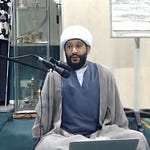Source of Video: Ashura Lecture: Night 9 | Shaykh Usama Abdulghani | 7/14/2024
Here are the key takeaways from the transcript, which appears to be a poetic and emotional retelling of the tragedy of Karbala, focusing on the loyalty of Hazrat Abbas (AS) and the martyrdom of Imam Hussain (AS):
1. Unwavering Loyalty & Sacrifice
Abbas (AS) as the epitome of devotion: His refusal to drink water while Imam Hussain (AS) and the children remained thirsty symbolizes ultimate selflessness.
"No one left the side of Hussain": Highlights the steadfastness of Imam Hussain’s companions, even in the face of certain death.
2. The Tragedy of Karbala
Heartbreaking imagery: The repeated cries of "My body’s broken, my heart is torn" and "I’m not alone" reflect Imam Hussain’s (AS) grief and resilience.
The fall of Abbas (AS): His severed arms, the spilled water, and his final moments underscore the brutality of the event and the depth of his sacrifice.
3. Themes of Justice & Resistance
Defiance against oppression: The narrative frames Karbala as a timeless struggle against tyranny, with Abbas (AS) and Hussain (AS) as symbols of moral courage.
"Loyalty is not for sale": A rejection of worldly compromise in favor of divine principles.
4. Communal Mourning & Spiritual Connection
Call to remembrance: Phrases like "Ya Hussain" and "Ya Abbas" are invocations of grief and solidarity, uniting believers in collective mourning.
The children’s suffering: The thirst of Imam Hussain’s family, especially the young, amplifies the emotional weight of the tragedy.
5. Theological & Moral Lessons
Obedience to the Imam: Abbas (AS) is portrayed as the perfect follower, whose actions guide believers on how to serve truth.
The inevitability of divine justice: The repeated "Inna lillah wa inna ilayhi raji’oon" (To God we belong and to Him we return) reinforces faith in God’s plan.
6. Contemporary Relevance
Personal reflection: Lines like "Where are your hands?" challenge listeners to ask themselves if they would stand for justice as Abbas (AS) did.
Hope for the Mahdi (AJ): The closing invocations ("Ya Mawla") express longing for the return of the 12th Imam as a redeemer.
Why This Matters Today
Universal message: Karbala’s lessons on sacrifice, justice, and resistance against oppression resonate across cultures and eras.
Spiritual empowerment: The narrative inspires perseverance in the face of adversity, anchored in faith.
Key Quote:
"Abbas, your severed arms carry me... Your sacrifice set me free."
→ A metaphor for how the martyrs’ legacy uplifts believers.
Emotional Impact: The raw repetition of grief ("How do we bear to see him?") and triumph ("Soldiers of God are never alone") makes this a powerful lamentation and call to action.












Share this post